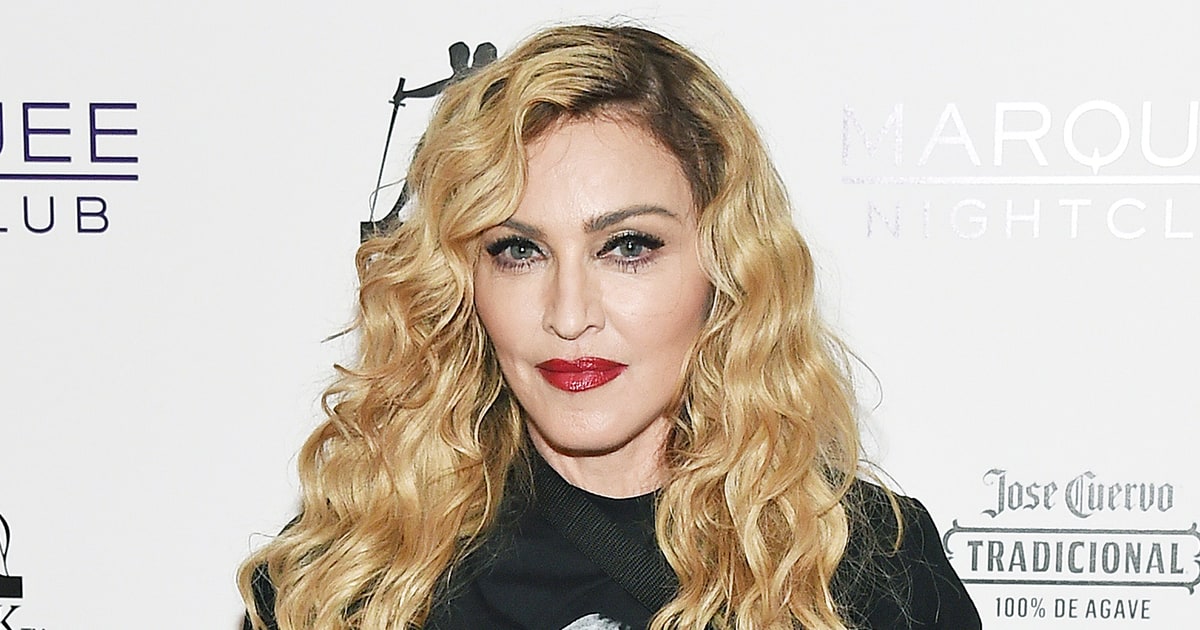MADONNA INTERVIEW
by Gareth Gorman
So Madonna’s gone and made a video which features her decked out in combats, straddling tanks, while George W Bush is lighting cigars with hand grenades. Then she withdraws it herself due to the inappropriateness of it all. Yet again Madonna has come up with a scheme more devious than a fox with honours in Cunning at Cambridge. And that’s because she’s been doing it all of her public life.
It’s that life of the c-word (celebrity) that Madonna is kicking against on the title track from her forthcoming American Life album. She does so in a breathtakingly bizarre rap that proceeds to list nannies, assistants and others employed as her yes-people. Morrissey has previously described it as ‘Fame, Fame / Fatal Fame’. Bowie & Lennon felt it was ‘hard to swallow / and put(s) you where things are hollow’. These guys may have known a thing or two about a thing or two, but no one can be better placed than the former Ms Ciccone, who craved fame way before the current ‘we’ll do anything, anytime’ small-time celebs crawled out of wherever in the last five years.
“Fame can be very disruptive,” claims the now Mrs Guy Ritchie. “It can be like a drug. It gives you the feeling that you’re happy, it gives you the feeling of self-importance, it gives you the feeling of fulfilment… but it can distract you from what is really important.
“A lot of people think that being a star is about getting your picture taken all the time, having everyone worship and adore you, getting the best table at the best restaurants and never having to wait in line. Studs galore always knocking at your door, being rich, rich, rich, having it all…and you know what? They’re absolutely right! [But] It’s hard for [people] to think of me as a person made of flesh and blood with feelings and fears and joys and frustrations like anyone else. The public has a hard time thinking of any celebrity as human. We become larger than life and are no longer attributed with human characteristics.”
It’s this dismissal of fame and the wisdom of a self-analytical 40-something that map out American Life, and nowhere is it so exquisitely expressed than on ‘Easy Ride’. What I want is to find my place / breathe the air and feel the sun on my children’s face. She’s become a mum. “All I hope is that I will be happy in my personal life with my friends, my family and the person I’m in love with. That’s the most important thing.”
Yet, you can always rely on Madonna to stir it up when she’s got something due – except maybe a baby. When she released ‘Like A Prayer’, the video of the title song featured her snogging a Negro Christ. Sure enough, Middle America reacted against this imagery, with it’s burning crosses and stigmata, and Madonna’s ad for Pepsi soon made its way to the never to be shown again bin. Of course, this is hardly an isolated incident. The release of ‘Papa Don’t Preach’ put her knee-deep in the hoopla thanks to the perennial topicality of its subject matter – a young pregnant girl wanting to keep her baby. As for Madonna’s acting career, it’s probably only the notoriety that gets her any box office. Remember Shanghai Surprise, made with then husband Sean Penn, and to which George Harrison had to fly out to ease rumours? Of course, the film was a total dud, just like Body Of Evidence and the sunk-without-a-trace 2002 effort directed by Guy. One of her rare film successes was the adaptation of Evita via Andrew Lloyd Webber (another person who knows to leech onto a good thing.) This and Desperately Seeking Susan amount to the only acting roles the public have accepted her in. There’s reason for this. In DSS, she’s basically playing herself, and no doubt also felt an affinity with Eva Peron.
“People were frightened of the power [Evita] had and undermined her accomplishments by calling her a whore. I can certainly relate to that. People intimidated by me feel the need to denigrate me. In this day and age, women are not rewarded for strength and determination. It turns into ‘control freak’ and ‘bitch’.
“I was never an icon and I was also never a woman who acted in a political way. Of course, I fought against male domination, against a world ruled by men, but I never wanted to change the world and turn male domination into female domination. What I did I did for myself, to free myself. I never really planned to be an idol for millions of women all over the planet and I never saw men in general as the enemy. The enemies were people who tried to suppress me, oppressors in general.”There was further clarification of the point.
“There are many people who think she [Evita Peron] was a saint, and there are other people who think she was Satan herself – and I can certainly identify with that,” she remarked to a VH1 interviewer in 1997. Of course, even this role came with plenty of controversy. Beside the general critical consensus beforehand that she couldn’t command the gravitas the role required, the people of Argentina almost revolted against the idea of Madonna playing their beloved first, once and future lady.
Madonna Sexual Assault
For the rather lame Erotica album which featured a limp cover of Peggy Lee’s ‘Fever’, there was plenty of fuss kicked up over her Sex book, released at the same time. The laudable fantasy book was also laughable in quality. Pages fell out, the price was extortionate, and Vanilla Ice was one of her photo layout partners. Her excuses for such heinous behaviour?
“I was really turning my nose up at the whole idea that women aren’t allowed to be sexual and erotic and provocative and intelligent at the same time.” (VH1 interview, 1998). But all this is the same as it ever was. Back in the days of her first album she appeared on American Bandstand. Dick Clarke asked her what she hoped to achieve. Madonna replied: “I want to rule the world.” And she’s gone about it with the zest of a power-crazed dictator. Titillation, calculated provocation and the ability to press buttons, to shock if she wants to, and to stay the right side of the line are the qualities that have pushed her to monolithic status.
“I know that I’m not the best singer, and I know that I’m not the best dancer, but I’m not interested in that. I’m interested in pushing people’s buttons, in being provocative, in being political.”She admitted her harnessing of shock tactics to Carrie Fisher during a Rolling Stone interview way back in 1991.
“I just sort of naturally say things to shock, not necessarily to offend. It’s like pulling the tablecloth off the table to disarm everybody.”These are not the machinations of your ordinary-Jo musician. This is a publicity-obsessed, media-addicted, power-driven, talent-loaded music mogul. If tabloids hadn’t existed you can bet Madonna would have invented them to spread her good news for modern woman and man.She crept up on us in the middle of the 80s – the decade of self-obsessiveness and (if Oliver Stone and Michael Douglas are to believed) greed. Madonna went on to parade her success like a Prada skin.
Bigger than a Planet
In 1992, Madonna confirmed then underlined not only her superstardom, but her business-sense, with a seven-year, $60 million deal with Time Warner. Under the pact, she became head of her own label, Maverick. Maverick has since gone on to massive success thanks to signings like Alanis Morissette and the Prodigy. As record company boss, Madonna now makes more from each Morissette album than she does from her own.But it’s her image and media manipulation that prove the most telling aspect of her bigger-than-a-planet persona. Masturbatory acts and religious iconography are littered along the way. It’s no accident that she first made herself known as the male-fantasy driven Virgin Slut. Yet she also managed to do it in a way that empowered women and therefore earned respect from those quarters as well. You were never in doubt that Madonna was in control.Just prior to beginning work with Mirwais once again (her collaborator for Music and American Life) Madonna caused sensation by appearing on the London stage in playwright David Williamson’s Up For Grabs. Madonna played an art dealer who would do virtually anything to make a sale. The storyline was spiced up by a lesbian kissing scene, a rather large sex aid, and some simulated masturbation. Like Evita and Desperately Seeking Susan, this seemed no stretch for her acting abilities or the public’s associations.
Madonna is admired, despised and feared because she’s a woman powerfully successful as an entertainer and an impresario, working and walking with more kahunas than the male in his natural domain. Madonna has never defined the times with her music in the way that, say, The Beatles did. She’s never been as amazing as Prince was before he lost his name and his plot. But she can spot a trend and go with it, adapting it to her shape and selling far more units than the collaborators she chooses (Mirwais, William Orbit). She may not be radical, nor revolutionary, but as a piece of cleverly marketed packaging she’s the full deal.As an arch media manipulator, Madonna has no peer. “I do think that I’ve been enlightened – and I truly feel that it’s my responsibility to share what I know with other people.”
Long may she reign.
Madonna’s new album American Life is out now through Warner Records.














